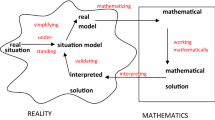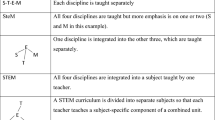Abstract
In this paper, we reflect on our experiences teaching and working with mathematics teachers in Canada, Ghana, India and Swaziland to explore challenges and opportunities for creating mathematics tasks for peace and sustainability. Our exploration of these experiences is oriented around our interest in embedding peace and sustainability into mathematics education following the Sustainable Development Goals identified by the United Nations. We claim that attention to local contexts affords mathematics educators a medium for engaging in authentic, meaningful and context-driven mathematics tasks that address issues of local environmental, cultural and societal concerns. However, we argue that globalisation has already colonised local communities. The associated “technoscientificity”, along with the conservative nature of textbooks, time constraints and the dominant force of poverty remain hindrances in creating mathematics tasks that are issue centric and socially relevant to address concerns of the local community. We end this paper by suggesting a development of a mathematics task to illustrate the possibility of creating what we call a “situated mathematics task” for students that respond to issues of local community using rural Ghana as a context.
Résumé
Dans cet article, nous analysons nos différentes expériences d'enseignement et de travail avec des professeurs de mathématiques au Canada, au Ghana, en Inde et au Swaziland, afin d’explorer les défis et les possibilités que posent la création de tâches mathématiques pour la paix et le développement durable. L’analyse de ces expériences est axée sur notre volonté d’intégrer la paix et le développement durable dans l'enseignement des mathématiques, conformément aux objectifs de développement durable adoptés par les Nations Unies. Nous estimons qu’une grande attention portée aux contextes locaux offre aux enseignants de mathématiques un moyen de participer à des tâches mathématiques authentiques, significatives et axées sur les contextes, qui répondent aux préoccupations environnementales, culturelles et sociétales locales. Cependant, nous sommes d’avis que la mondialisation a déjà amplement colonisé les communautés locales. La techno-scientificité associée à ce phénomène, ainsi que la nature conservatrice des manuels scolaires, les contraintes de temps et la pauvreté dominante, demeurent des obstacles à la création de tâches mathématiques centrées sur les problèmes locaux et socialement pertinentes pour répondre aux préoccupations des communautés locales. Nous terminons cet article en proposant le développement d'une tâche mathématique pour illustrer la possibilité de créer ce que nous appelons une « tâche mathématique située en contexte » destinée aux élèves qui souhaitent répondre à des problèmes de leur communauté locale, en utilisant le Ghana rural comme contexte.
Similar content being viewed by others
References
Agustini, D. P. (2016). Teacher education program and the challenges of quality and equality in education. Dialektika Journal PBI, 4(1), 1–19.
Bartell, T. G. (2013). Learning to teach mathematics for social justice: Negotiating social justice and mathematical goals. Journal for Research in Mathematics Education, 44(1), 129–163.
Bishop, A. (1990). Western mathematics: the secret weapon of cultural imperialism. Race & Class, 32(2), 51–65.
Blackstock, C. (2009). First Nations child and family caring society of Canada: Federal government underfunding of children’s services on reserves as a risk factor for disadvantage including sexual exploitation. Submission to Senate Committee on Human Rights.
Cherubini, L., Hodson, J., Manley-Casimir, M., & Muir, C. (2010). “Closing the gap” at the peril of widening the void: Implications of the Ontario Ministry of Education’s policy for Aboriginal Education. Canadian Journal of Education, 33(2), 329–355.
Coles, A., Barwell, R., Cotton, T., Winter, J., & Brown, L. (Eds.). (2013). Teaching mathematics as if the planet matters. London, England: Routledge. Community, Ghana (Unpublished Masters Thesis, University of British Columbia).
Darling-Hammond, L. (2017). Teacher education around the world: What can we learn from international practice? European Journal of Teacher Education, 40(3), 291-309. Gandhi Institute of Education for Peace and Sustainable Development. Retrieved from: http://unesdoc.unesco.org/images/0025/002599/259932e.pdf
FAO. (2011). The state of food and agriculture 2010-11: Women in agriculture. Rome. Food and Agriculture Organisation.
Gutstein, E. (2012). Connecting community, critical, and classical knowledge in teaching mathematics for social justice. In S. Mukhopadhyay, & W.M. Roth (Eds.). Alternative forms of knowing (in) mathematics: Celebrations of diversity of mathematical practices (pp. 299-311). Boston: Sense.
Gutstein, E. (2009). Possibilities and challenges in teaching mathematics for social justice. Critical issues in mathematics education, 351-373.
Hyland, K. (2000). Disciplinary discourses: Social interactions in academic writing. New York: Longman.
Kakekaspan, M., O’Donnell, S., Beaton, B., Walmark, B., & Gibson, K. (2014). The first mile approach to community services in Fort Severn First Nation. Journal of Community Informatics, 10(2).
Kim, M. & Wagner, D. (2019). Science and mathematics textbook authors' hopes for peace and sustainability in a changing world. Paper presented at the American Educational Research Association Annual Meeting, Toronto, Canada.
Kuhn, T. (1970). The structure of scientific revolutions (2nd edition). Chicago: University of Chicago Press.
Newmann, F., Secada, W., & Wehlage, G. (1995). A guide to authentic instruction and assessment: vision, standards and scoring. Madison, WI: Wisconsin Center for Education Research.
Osei, K. (2015). The Education Crisis In Ghana. Retrieved from https://www.modernghana.com/news/623506/the-education-crisis-in-ghana.html
Simon, J., Burton, K., Lockhart, E., & O'Donnell, S. (2014). Post-secondary distance education in a contemporary colonial context: Experiences of students in a rural First Nation in Canada. The International Review of Research in Open and Distributed Learning, 15(1).
Skovsmose, O. (2018). Critical constructivism: interpreting mathematics education for social justice. For the Learning of Mathematics, 38(1), 38-42. Teaching mathematics for social justice. In Alternative forms of knowing (in) mathematics (pp. 300-311). Sense Publishers, Rotterdam.
Toledo, N. D. T., Knijnik, G., & Valero, P. (2018). Mathematics education in the neoliberal and corporate curriculum: The case of Brazilian agricultural high schools. Educational Studies in Mathematics, 99(1), 73–87.
UNESCO-MGIEP. (2017). Textbooks for sustainable development: A guide to embedding. New Delhi: United Nations Educational, Scientific and Cultural Organization Mahatma Gandhi Institute of Education for Peace and Sustainable Development. Retrieved from: http://unesdoc.unesco.org/images/0025/002599/259932e.pdf
United Nations. (2015). Resolution adopted by the General Assembly on 25 September 2015. New York: United Nations. Retrieved from: http://www.un.org/ga/search/view_doc.asp?symbol=A/RES/70/1&Lang=E
United Nations (UN). (2018). United Nations Sustainable Development Knowledge Platform. Retrieved from https://sustainabledevelopment.un.org/
Wager, A. A., & Stinson, D. W. (Eds.). (2012). Teaching mathematics for social justice: Conversations with educators. National Council of Teachers of Mathematics.
Wagner, D. (2019). Situated mathematics: Positioning mathematics ideas as human ideas. In T. Toh, & J. Yeo (Eds.). Big ideas in mathematics: Yearbook 2019, Association of Mathematics Educators (pp. 47-70). Singapore: World Scientific.
Wagner D. & Davis, B. (2010). Feeling number: Grounding number sense in a sense of quantity. Educational Studies in Mathematics, 74(1), 39–51.
World Bank. (2014). Ghana Secondary Education Improvement Project. Retrieved from: http://www.worldbank.org/en/country/ghana/brief/secondary-education-improvement-project-frequently-asked-questions-and-answers
Yaro, K. (2015). Parental involvement in children's mathematics learning: a case of a rural community, Ghana. (Unpublished Masters Thesis, University of British Columbia).
Author information
Authors and Affiliations
Corresponding author
Additional information
Publisher’s Note
Springer Nature remains neutral with regard to jurisdictional claims in published maps and institutional affiliations.
Rights and permissions
About this article
Cite this article
Yaro, K., Amoah, E. & Wagner, D. Situated Perspectives on Creating Mathematics Tasks for Peace and Sustainability. Can. J. Sci. Math. Techn. Educ. 20, 218–229 (2020). https://doi.org/10.1007/s42330-020-00083-w
Published:
Issue Date:
DOI: https://doi.org/10.1007/s42330-020-00083-w




